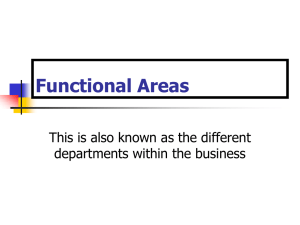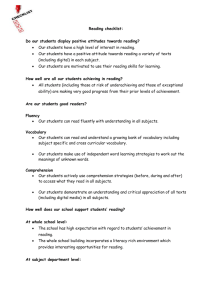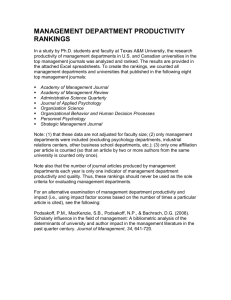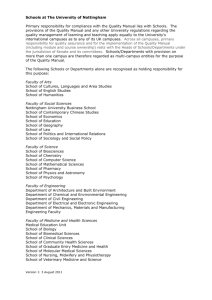HLC Assessment Pre-work Draft 7-10-2013
advertisement
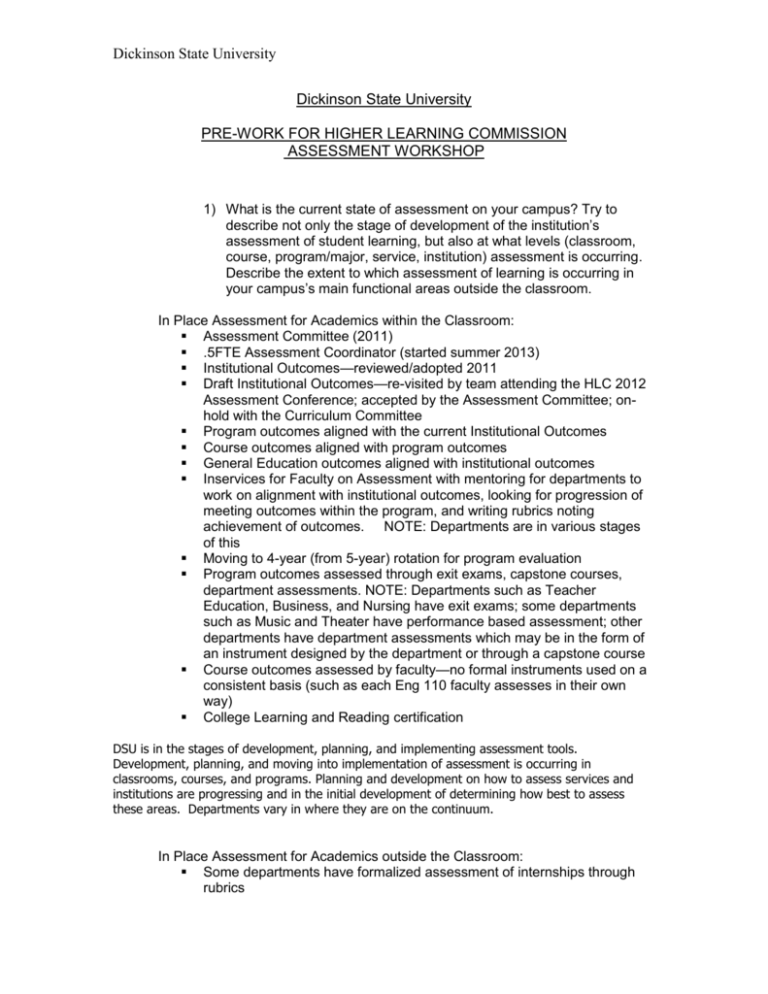
Dickinson State University Dickinson State University PRE-WORK FOR HIGHER LEARNING COMMISSION ASSESSMENT WORKSHOP 1) What is the current state of assessment on your campus? Try to describe not only the stage of development of the institution’s assessment of student learning, but also at what levels (classroom, course, program/major, service, institution) assessment is occurring. Describe the extent to which assessment of learning is occurring in your campus’s main functional areas outside the classroom. In Place Assessment for Academics within the Classroom: Assessment Committee (2011) .5FTE Assessment Coordinator (started summer 2013) Institutional Outcomes—reviewed/adopted 2011 Draft Institutional Outcomes—re-visited by team attending the HLC 2012 Assessment Conference; accepted by the Assessment Committee; onhold with the Curriculum Committee Program outcomes aligned with the current Institutional Outcomes Course outcomes aligned with program outcomes General Education outcomes aligned with institutional outcomes Inservices for Faculty on Assessment with mentoring for departments to work on alignment with institutional outcomes, looking for progression of meeting outcomes within the program, and writing rubrics noting achievement of outcomes. NOTE: Departments are in various stages of this Moving to 4-year (from 5-year) rotation for program evaluation Program outcomes assessed through exit exams, capstone courses, department assessments. NOTE: Departments such as Teacher Education, Business, and Nursing have exit exams; some departments such as Music and Theater have performance based assessment; other departments have department assessments which may be in the form of an instrument designed by the department or through a capstone course Course outcomes assessed by faculty—no formal instruments used on a consistent basis (such as each Eng 110 faculty assesses in their own way) College Learning and Reading certification DSU is in the stages of development, planning, and implementing assessment tools. Development, planning, and moving into implementation of assessment is occurring in classrooms, courses, and programs. Planning and development on how to assess services and institutions are progressing and in the initial development of determining how best to assess these areas. Departments vary in where they are on the continuum. In Place Assessment for Academics outside the Classroom: Some departments have formalized assessment of internships through rubrics Dickinson State University Little assessment of co-curriculars DSU Res Life Goals and Values Bookle 2) How are assessment activities organized or coordinated on your campus? Who (or what office) is responsible for coordinating assessment activity and data? Include in this response a description of what is done with assessment results. Organized/coordinated by the Assessment Committee and the Assessment Coordinator in concert with the Deans Formal exit exam assessment results are shared with the department chair with the assumption that they will share results with the department and make needed/warranted curricular changes Program exit results are recorded and kept within the departments Course assessments are noted by faculty No formal plan for assessment results to be reviewed institutionally except as required by Dean/Chairs/VPAA. Departments review/use results in varying degrees. Newly hired Coordinator of Institutional Research 3) What do you see as your essential current needs if assessment of student learning is going to grow and produce valuable improvements on your campus? What current practices seem to be producing good results? Outside consultation to determine if we are missing important elements in the assessment plan/strategies Current practices seem to be melding assessment practices into a more meaningful context as we are holding similar expectations for use of assessment and review of assessment information “Outside of the Classroom Assessment” More conversation and collaboration between departments PD on campus and time to work within department and with others\ Because some departments have their plan and have implementation, while others are still planning preparing to implement in the fall semester, we are working to assure that all are getting the assistance that they need to move forward. 4) What specific results would you like from this workshop? Guidance/input from our mentor and others about our current assessment practices and information about what else we should consider Information on indicators of/and strategies to increase persistence and retention and recruitment Further reflection on Criteria 3 and 4 as to evidence, etc. Working models of assessing co-curriculars 5) What specific help would you like your mentor to provide? Input as to our current assessment plan and implementation Dickinson State University Insight as to how to approach assessment outside of the classroom, particularly for co-curriculars As we are heading toward our PEAQ visit in March 2015, we would like additional insight as to the HLC expectations of assessments outside of the classroom (co-curricular) Ideas of how dual credit works within this Information about understanding “type 1 and type 2 errors”—how do we differentiate as to when to make changes and when not to How to best assess general education skills and objectives. Helping to develop a plan on assessing if the student learning outcomes are achieved among the students in their general education courses.



